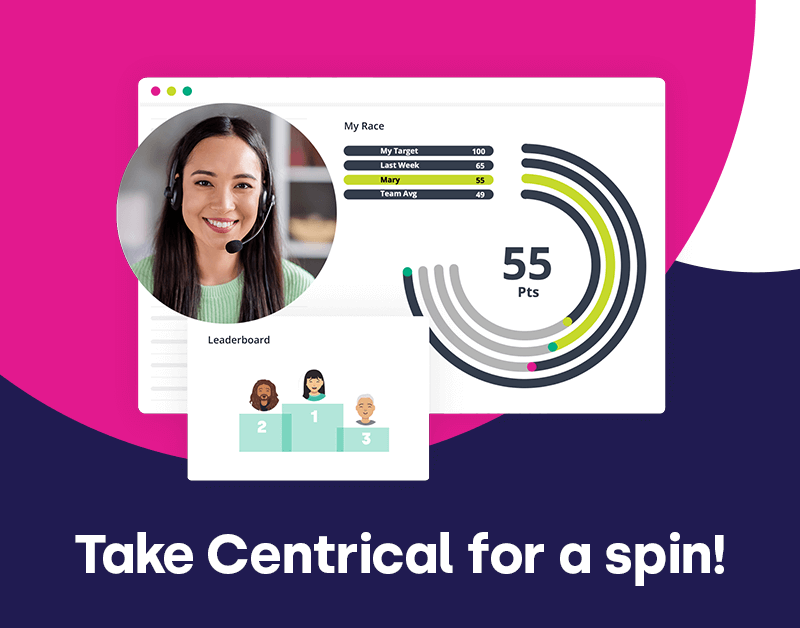Despite a constantly evolving work environment, one factor remains constant in determining a company’s success: employee engagement. In fact, recent Gallup research shows that by increasing employee engagement, businesses can win back $1.9 trillion in lost productivity.
The concept of employee engagement relates to the emotional connection and commitment employees have toward their work and organization. In this guide, we’ll explore the essence of employee engagement, its pivotal role in organizational success, the stakeholders involved, and proven strategies to enhance this in your workplace.
What is Employee Engagement?
Employee engagement is much more than just job satisfaction. It’s about employees’ sense of purpose, belonging, and enthusiasm. Engaged employees are deeply invested in their work, driven by a shared vision, and committed to realizing organizational goals. They are more likely to go above and beyond their job descriptions to contribute positively to the organization’s success.
Why is Employee Engagement Important?
Employee engagement is important because it is the foundation of organizational effectiveness and competitiveness. When employees are engaged, they are the driving force behind increasing productivity, innovation, and customer satisfaction. Their work culture typically fosters and encourages collaboration, creativity, and continuous improvement. All of this pays off – organizations with high levels of employee engagement enjoy lower turnover rates, reduced absenteeism, enhanced resilience in the face of challenges, and, ultimately, for customer-facing organizations, an outstanding customer experience.
Who Oversees Employee Engagement?
The responsibility for driving and nurturing employee engagement is shared within the organization. Human Resources (HR) professionals play a pivotal role in spearheading initiatives, conducting surveys, and analyzing feedback to gauge employee sentiment. However, the onus of encouraging a culture of engagement extends beyond HR; it requires committed leadership, transparent communication, and grassroots involvement. Managers and team leaders are at the frontline when it comes to building trust, providing guidance, and recognizing contributions – all of which are major contributors to employee engagement.

11 Strategies for Improving Employee Engagement
Getting employees engaged with their work can be challenging, but it doesn’t have to be. Below are ten proven strategies for driving employee engagement:
- Empower Employees
Empower employees by entrusting them with autonomy and decision-making authority. This includes providing an environment where employees are encouraged to voice their opinions, make decisions, and innovate, through providing a culture of ownership, accountability, and continuous improvement.
- Make Work Meaningful
Aligning employees’ responsibilities with the organization’s mission and values helps them find purpose and meaning in their roles. When employees understand how their work contributes to the bigger picture, this makes a tangible impact on engagement and overall organizational success.
- Offer Professional Development
Invest in the growth and development of your workforce through continuous learning and skill enhancement programs. Offer opportunities for training, workshops, and mentorship to empower employees to expand their capabilities, pursue their career aspirations, and stay relevant in a rapidly changing business environment.
- Recognize Work-Life Balance
A healthy work-life balance plays a pivotal role in building employee engagement. To alleviate stress and burnout, prioritize well-being with flexible work arrangements, wellness programs, wellness check-ins, and other initiatives. It’s also important to recognize the importance of downtime and encourage employees to recharge and disconnect outside of work hours.
- Be Transparent
Encourage open, honest, and transparent communication within the organization. Keep employees informed about company updates, goals, and performance metrics. Promote dialogue, feedback, and active listening to build trust, transparency, and alignment.
- Recognize and Reward
Don’t just course correct – make sure to acknowledge and celebrate employee contributions and achievements regularly. Implement a comprehensive, personalized recognition and rewards program that acknowledges individual and team accomplishments.
- Build a Collaborative Culture
Cultivate a culture where teamwork, cooperation, and mutual support are valued and encouraged. This can include cross-functional collaboration, knowledge sharing, and idea exchange to harness your team’s collective experience and creativity.
- Develop Your Leaders
Invest in leadership development programs to equip managers and supervisors with the skills and competencies needed to effectively lead, inspire, and engage their teams. Provide ongoing coaching, mentorship, and feedback to drive strong, empathetic, and inclusive leadership.
- Embrace Flexibility and Adaptability
Few things go exactly as planned. Instill flexibility and adaptability as core organizational values and empower employees to adapt to change, navigate uncertainty, and embrace new challenges with resilience and agility. To achieve this, promote a culture that celebrates innovation, experimentation, and continuous learning.
- Engage Through Community
Encourage employees to get involved in community service and social impact initiatives. Support volunteerism, charitable giving, and corporate social responsibility efforts that align with the organization’s values and priorities.
- Gamify the Experience
Gamification is the application of game mechanics (including leaderboards, badges, and points) to a non-game context, such as a workflow. By tapping into intrinsic and extrinsic motivators, gamification helps motivate and engage employees, driving long-term performance improvement.

The Benefits of Having Engaged Employees
Companies where employees are engaged have been shown to produce better results than those with lower engagement. This can be observed across the following areas:
Increased Productivity and Performance: According to Gallup research, highly engaged teams achieve 23% greater profitability compared to their disengaged counterparts. Engaged employees exhibit a strong commitment to their work, and are generally more proactive in seeking out opportunities for improvement, driving innovation, and delivering exceptional results.
Enhanced Employee Satisfaction and Retention: When employees are engaged, they contribute to a positive work environment characterized by high job satisfaction and retention levels. They feel valued, supported, and appreciated by their organization, leading to greater job satisfaction and loyalty. This, in turn, reduces turnover rates and helps organizations retain top talent, saving on recruitment and training costs.
Greater Innovation and Creativity: Engaged employees are more likely to feel empowered to share their insights, experiment with new approaches, and collaborate with colleagues to solve complex problems – enabling organizations to stay ahead in competitive markets.
Improved Customer Satisfaction and Loyalty: Engaged employees are instrumental in delivering exceptional customer experiences, which lead to long-term loyalty.
Reduced Absenteeism and Turnover Rates: Employees who are engaged have a stronger sense of commitment to their work and colleagues, which leads to greater reliability. This translates to reduced absenteeism and turnover, ensuring continuity and stability in the workforce.
Enhanced Organizational Resilience and Adaptability: Engaged employees embrace change as an opportunity for growth and innovation, rather than a threat. Their proactive mindset and willingness to learn new skills enable organizations to navigate challenges and seize opportunities effectively.
Measuring Employee Engagement
Effectively measuring employee engagement is crucial for optimizing workforce performance and creating a culture of excellence. Many methods and tools are available to assess employee engagement, identify areas for improvement, and tailor strategies to enhance engagement levels. Here are some common methods of measuring employee engagement:
Surveys and Questionnaires
Gauge employee perceptions and sentiments regarding their work environment, job satisfaction, and organizational culture. Surveys and questionnaires typically cover job autonomy, career development opportunities, work-life balance, leadership effectiveness, and other topics. Surveys help organizations identify trends, strengths, and areas for improvement, helping to guide strategic decision-making.
Pulse Checks
Pulse checks are brief, frequent surveys to gather real-time feedback from employees on specific topics or issues. These surveys provide a snapshot of employee sentiments at a particular moment, enabling organizations to promptly address concerns and capitalize on opportunities for improvement.
Focus Groups
Focus groups bring together small groups of employees to discuss specific topics or issues related to employee engagement. These sessions provide a forum for open dialogue, idea sharing, and qualitative feedback, allowing organizations to gain deeper insights into employee perceptions and experiences. Focus groups can complement quantitative data from surveys, offering a more nuanced understanding of employee engagement drivers and barriers.
Performance Analytics
Performance analytics leverage data to assess employee engagement and performance metrics. Organizations can correlate employee engagement with key business outcomes by analyzing turnover rates, absenteeism, productivity levels, and customer satisfaction scores.
Feedback Platforms
Feedback platforms facilitate continuous feedback and communication between employees and managers, enabling real-time engagement tracking and performance monitoring. These platforms allow employees to provide feedback, share ideas, and seek support from their managers – resulting in a culture of transparency, accountability, and continuous improvement.
Incorporating a combination of these measurement methods enables organizations to gain comprehensive insights into employee engagement and identify actionable strategies for improvement.

Meet Centrical, the #1 Gamification-Based Performance Experience Platform
Organizations are increasingly seeking to better engage employees and are turning to innovative solutions offered by platforms like Centrical to boost engagement. Centrical provides a suite of solutions designed to revolutionize employee engagement and drive organizational success. By harnessing cutting-edge technology and gamification principles, Centrical offers a range of solutions tailored to enhance employee motivation, performance, and satisfaction.
Gamified Learning Experiences: By incorporating game elements such as challenges, rewards, and leaderboards, Centrical motivates employees to actively participate in learning activities, resulting in increased knowledge retention and skill development. Through personalized learning paths and real-time feedback, employees are empowered to acquire new skills and competencies at their own pace, driving continuous growth and professional development.
Performance Management Solutions: By leveraging data analytics and performance metrics, Centrical enables managers to track progress, identify areas for improvement, and provide timely feedback and coaching to their teams. Through goal setting, performance tracking, and recognition programs, Centrical empowers employees to align their efforts with organizational objectives and strive for excellence.
Personalized Coaching and Feedback: Through AI-driven insights and personalized recommendations, Centrical enables managers to deliver targeted coaching and feedback tailored to each employee’s unique needs and preferences. By providing actionable insights and guidance, Centrical empowers employees to overcome obstacles, maximize their potential, and achieve their goals, enabling a culture of continuous improvement and high performance.
Employee Recognition and Rewards: With gamified reward systems, Centrical motivates employees to go above and beyond, driving engagement and performance over the long term. Centrical fosters a culture of appreciation and recognition, from peer-to-peer recognition to milestone celebrations, strengthening morale and loyalty.
Data-Driven Insights and Analytics - Centrical enables organizations to identify patterns, uncover hidden insights, and make data-driven decisions to optimize workforce effectiveness by analyzing data from various sources, including surveys, performance metrics, and feedback. With real-time dashboards and customizable reports, Centrical empowers organizations to monitor progress, measure impact, and drive continuous improvement initiatives.
Centrical’s innovative solutions offer a comprehensive approach to enhancing employee engagement and driving organizational success. By leveraging gamification, personalized coaching, performance management, and data analytics, Centrical enables organizations to unleash the full potential of their workforce, create a culture of excellence, and achieve sustainable long-term growth.
The Bottom Line
Employee engagement is a strategic imperative that underpins organizational success and sustainability. Organizations can encourage creativity, productivity, resilience, and innovation by implementing a holistic approach to employee engagement and leveraging innovative solutions like Centrical.
Now, you can prioritize employee engagement, invest in your most valuable asset – your people – and embark on a transformative journey towards organizational greatness.
To learn more about how Centrical can take your employee engagement to new heights, request your personalized demo today.
Engage and motivate your frontline teams
Improve performance with an AI-powered digital coach
Deliver world class CX with dynamic, actionable quality evaluations
Boost performance with personalized, actionable goals
Nurture employee success with the power of AI
Listen and respond to your frontline, continuously
Drive productivity with performance-driven learning that sticks
Drive agent efficiency, deliver client results
Keep tech teams motivated and proficient on products and services while exceeding targets
Maintain compliance while building customer happiness and loyalty
Enlighten energy teams to boost engagement
Engage, develop, and retain your agents while driving better CX
Improve the employee experience for your reservations and service desk agents










 Madeleine Freind
Madeleine Freind
 Natalie Roth
Natalie Roth Linat Mart
Linat Mart












 Doron Neumann
Doron Neumann Gal Rimon
Gal Rimon Daphne Saragosti
Daphne Saragosti Ella Davidson
Ella Davidson Ariel Herman
Ariel Herman Ronen Botzer
Ronen Botzer